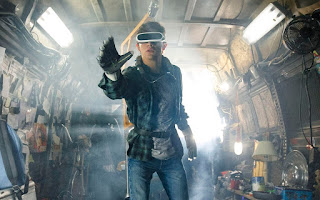"I Used To Sleep On A Lamb's Wool Beanbag Next To An Electric Space Heater. That's My Territory, I'm An "Indoor" Dog..."
Whether you feel the back catalogue of Wes Anderson falls too heavily on the kooky spectrum at times, there is no doubting that the stylish cinematic sensibility which springs to mind whenever you think of the likes of The Grand Budapest Hotel or Moonrise Kingdom is undoubtedly one stamped with a seal which paints the American as a contemporary, modern example of someone willing to expand and explore the vast array of horizons possible on film. Following on from his use of stop-motion animation on 2009's Fantastic Mr. Fox, Anderson once again utilises the format on Isle of Dogs, a surreal, comedy caper set in a dystopian near-future city in Japan, one ruled by the tyrannical Mayor Kobayashi who resorts to signing an executive order which immediately orders the evacuation of the ever-expanding populous of dogs onto "Trash Island" due to an outbreak of "dog fever". With an extensive and highly impressive voice cast, Isle of Dogs is on the one hand an incredibly successful animated exercise, with the flawless and detailed approach to the creation of the movie plain to see from the outset, but with a one-card trick holding up its' central narrative, Anderson's latest is entertaining, but far from utterly captivating.
Whilst accents and language utilised within the confines of successful comedic features isn't wholly original and has been used many times before, most predominantly in last year's The Death of Stalin which of course featured Jason Isaacs donning a Yorkshire accent for his depiction of Georgy Zhukov, Anderson's celebrity shopping list of a voice cast resorts to an entertaining game of "guess who" as the film progresses, with Bryan Cranston (Breaking Bad), Edward Norton (Birdman) and Bill Murray (The Jungle Book) the immediate trio of recognisable dulcet tones as the leading pack of the movie who come across Koyu Rankin's Atari Kobayashi, the young Mayor's aid, who travels to Trash Island in order to locate his lost dog, "Spots". With most of the film laying focus on the superb animation, the movie does unfortunately suffer from a sense of being a joke strung out too long, and whilst the pace of the movie is nicely balanced, with the narrative moving back and forth in both time periods and locations in a Scorsese-esque edited fashion, Isle of Dogs does come the end of it, feel quite flat and all too focused on surface rather than depth, but with a cute, barking-mad feel to it and the fact that nobody can turn down a fluffy haired canine, Anderson's movie works to a solid, not spectacular, degree.























